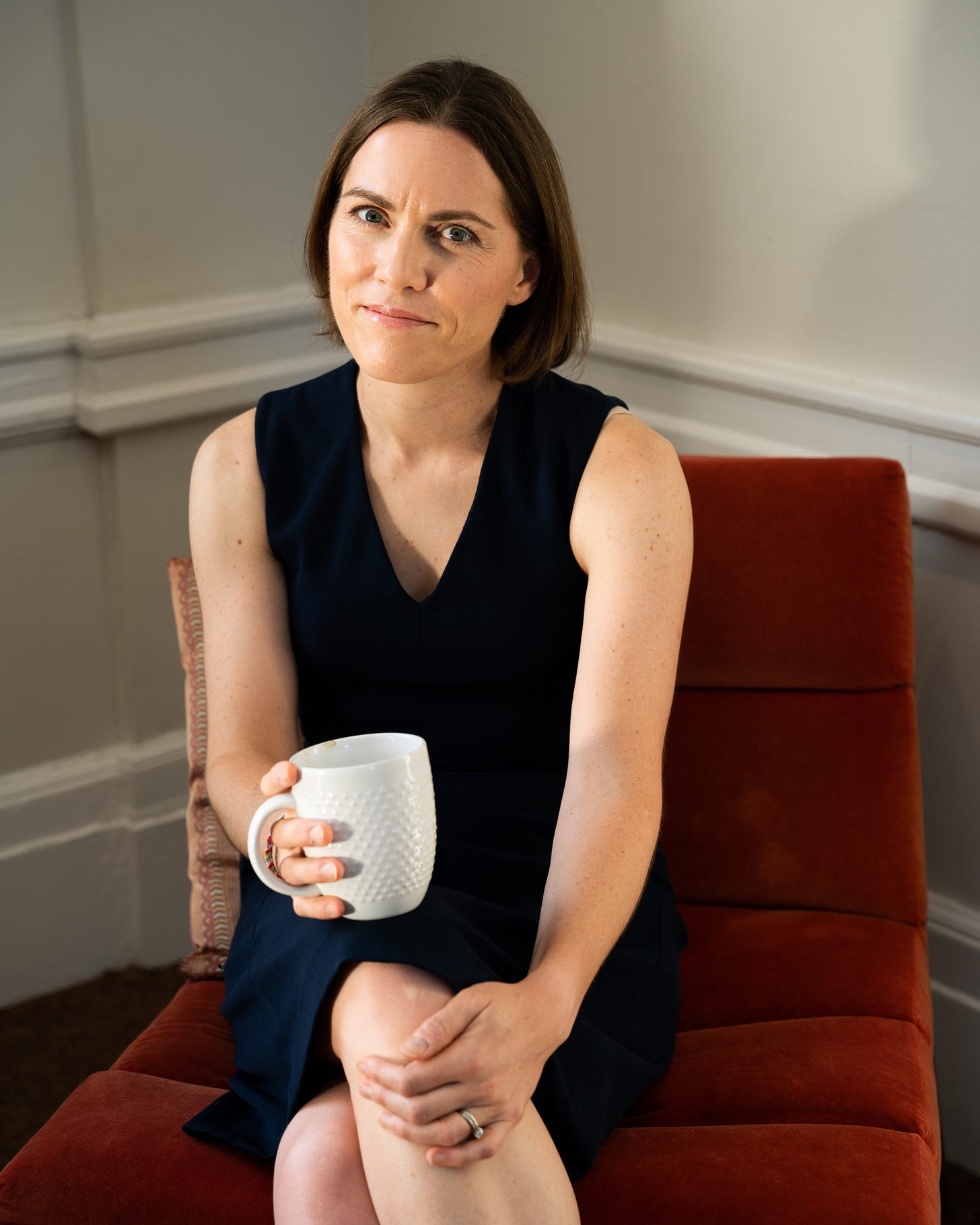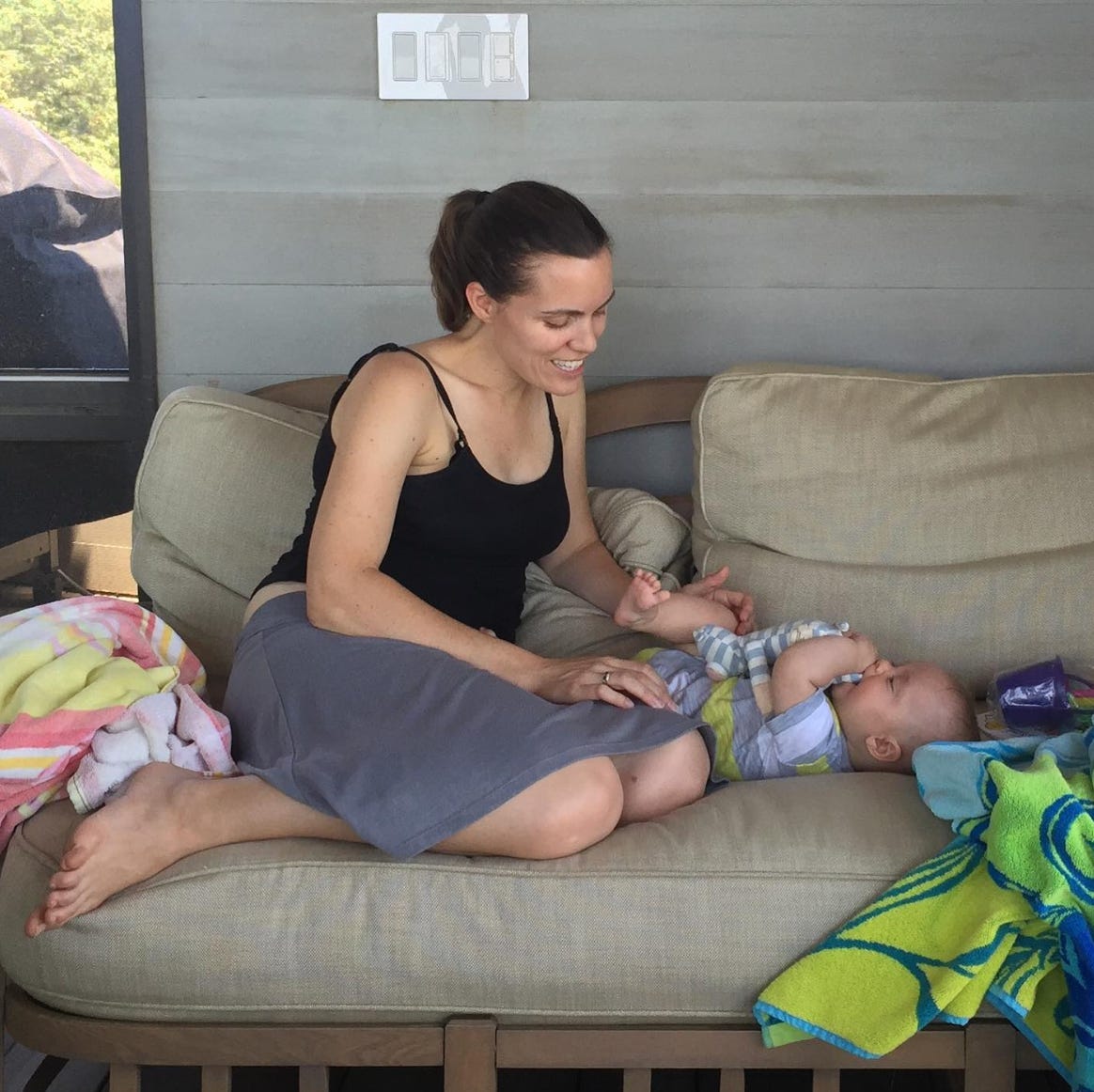Motherhood Identity Series with Emily Oster, founder of ParentData, professor & author
This author and professor has become a household name & trusted resource for millions of parents. Here, a look into her mothering experience.
When we experienced pregnancy for the first time—we both felt overwhelmed by the sheer amount of information, restrictions and guidelines. Our mom friends were quick to recommend reading anything-and-everything by Emily Oster. After devouring Expecting Better, we were hooked—and quickly considered her our guru.
Why are we such fans? She gets it: she understands that navigating parenthood can often feel like finding a path through a maze of conflicting advice. As a professor of economics at Brown University, founder of ParentData, and a best-selling author, she’s dedicated to providing parents with clear, data-driven insights that empower them to make confident decisions at every stage.
Since launching ParentData, Emily has built a thriving community with 434,000 Instagram followers and over 229,000 newsletter subscribers, all seeking her thoughtful, evidence-based approach to parenting. Her books, including Expecting Better, Cribsheet, The Family Firm and The Unexpected, have collectively sold more than a million copies, reflecting her impact in transforming how parents approach everything from pregnancy to school choice.
Beyond her professional accomplishments, Emily's work is inspired by her journey as a mother to Penelope, 13, and Finn, 9. With each new stage of her children’s lives, Emily brings real-time insights to her work, translating her own parenting challenges and triumphs into relatable and practical advice.
Recently, she sat down with us for this week’s Motherhood Identity Series. In our conversation, we get a closer look at how Emily has balanced her academic career, authorship, her new partnership with KiwiCo, and the day-to-day realities of motherhood… all while creating a movement that redefines what it means to be an informed, empowered parent.
What inspired you to partner with KiwiCo and their approach to play for young children? How is this not only helpful for kids—but for moms, too?
I have been a personal fan of the KiwiCo products for years—my kids love them, and they are my go-to gift for kids of all ages. I’m aligned with their mission to empower kids through hands-on play, and the KiwiCo Panda Crate is great for getting developmentally appropriate toys to kids. We know that babies will play for longer with toys that are matched to their developmental level, but as parents it can be hard to know what that is.
Having someone else—an expert—figure that out for you and have the toys delivered to your door, that’s pretty perfect.
My kids are now older, and I’ve got nieces and nephews ranging from 1 to 16. They have something for every age and stage, which means one sibling can be learning to finger-knit while another is building a delivery robot and another one is learning to sort shapes. They’re all being pushed to figure out something new, but at a level they can understand.
For parents, this is not only a way to find age-matched toys for your kids, but also a way to foster independent play. In our era of intensive parenting, this can be hard to find – and knowing our kids are engaged and happy makes it easier.
In your book Cribsheet, you discuss decision-making in parenthood based on data. How has becoming a mother shifted the way you view yourself, particularly as both a researcher and a parent?
I am trained as an economist, and in my academic research I focus on using data to think about the impact of policies, and on how we can identify the best data to answer key economic questions. When I got pregnant, and then became a parent, I kept that focus on data, but I turned it (at least some of the time) to my pregnancy and parenting. In a sense, my books are just like my research, but about a totally new topic. But I’ve always seen myself as data-first, and that hasn’t changed at all.
Motherhood can bring a sense of loss or shift in identity. How did becoming a mother challenge or reinforce your sense of self as an academic and economist?
Before I had kids I was totally devoted to my job (and my husband! But my job needed me more). When my daughter was born there was all of a sudden something in my life which I cared about in many ways much more than my work, but I found that I still did care about my job. My kids taught me you can have multiple senses of self: I was a mom, but also still an economist. I think it set me up well to make a transition in my professional life, too—to be an economist and a writer.
In Expecting Better, you provide evidence-based insights for pregnancy. How did your personal experience of motherhood influence the way you approached researching and writing your books?
I sometimes describe Expecting Better as a combination of memoir and meta-analysis. It is a book that begins with my expertise, in data and evidence, but is driven by my own experience with pregnancy and parenting. To the extent the books resonate, I think it’s because of this combination – the (correct) feeling that I’m right there with the reader, having the same issues, and bringing data to soothe us.
You’ve mentioned that motherhood changed how you think about time management and work-life balance. Can you describe a moment when you felt this shift most strongly, and how it affected your identity?
What comes to mind here is a moment when my daughter was about 10 months, and I got some really good news at work. Something which, before children, would have been the absolute best thing that happened to me in many months or even years. I called my husband to tell him, and we were both incredibly excited, and mutually agreed it was almost as exciting as when our daughter figured out the previous day to take off her own socks. It’s a simple example, but illustrates to me how the balance of joy had shifted, but also how there could still be joy in both parts of my life.
How has your perspective on decision-making, particularly when it comes to balancing data and intuition, evolved since becoming a mother?
One of the most important things I’ve learned in the past years is that data is useful, but data isn’t bossy. It’s almost never going to give you an answer to how you must do things. Instead, data is a scaffolding for our decision-making.
For example: thinking about independent play. We know that independent play can help kids with problem solving and development (that’s the data —and part of the reason I’m so excited about the partnership with KiwiCo). But knowing that data doesn't tell you how to incorporate independent play into your life. For that, you need your preferences, intuition, gut—whatever word you want to use—which can help you figure out what’s the right way to do this for your own child and your own family.
You've been a strong advocate for data-driven parenting choices. How has your personal experience of motherhood changed your view on the 'right' way to parent and manage your multiple identities?
By FAR the most important thing I’ve learned in the past decade is that there is no right way to parent, only a right way for you. If everyone could absorb that simple statement, I think we’d be a lot happier—and less judgmental.
As founders of our mother-first company, we always recommend your work, subscribe to your newsletter and follow along on Instagram. You were our ‘Bible’ during pregnancy! What’s it like being a go-to source for expecting and new parents?
I’ve learned that what you do with your authority and influence is just as important as having the credentials. My ultimate goal is to empower parents by providing them with the data and tools they need to make confident decisions. In partnering with companies like KiwiCo who share my vision, I’m able to achieve this while also showing parents how they can combine the joy of learning through play with evidence-based guidance.







